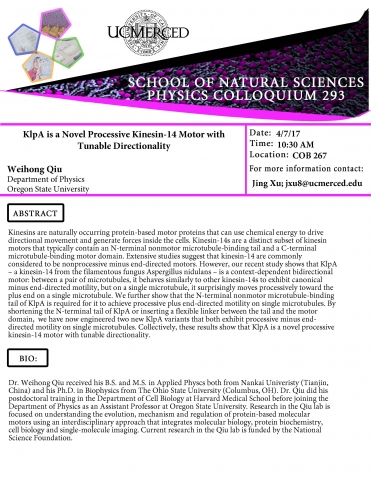Weihong Qiu, Oregon State University
Abstract:
Kinesins are naturally occurring protein-based motor proteins that can use chemical energy to drive directional movement and generate forces inside the cells. Kinesin-14s are a distinct subset of kinesin motors that typically contain an N-terminal nonmotor microtubule-binding tail and a C-terminal microtubule-binding motor domain. Extensive studies suggest that kinesin-14 are commonly considered to be nonprocessive minus end-directed motors. However, our recent study shows that KlpA – a kinesin-14 from the filamentous fungus Aspergillus nidulans – is a context-dependent bidirectional motor: between a pair of microtubules, it behaves similarly to other kinesin-14s to exhibit canonical minus end-directed motility, but on a single microtubule, it surprisingly moves processively toward the plus end on a single microtubule. We further show that the N-terminal nonmotor microtubule-binding tail of KlpA is required for it to achieve processive plus end-directed motility on single microtubules. By shortening the N-terminal tail of KlpA or inserting a flexible linker between the tail and the motor domain, we have now engineered two new KlpA variants that both exhibit processive minus end-directed motility on single microtubules. Collectively, these results show that KlpA is a novel processive kinesin-14 motor with tunable directionality.




